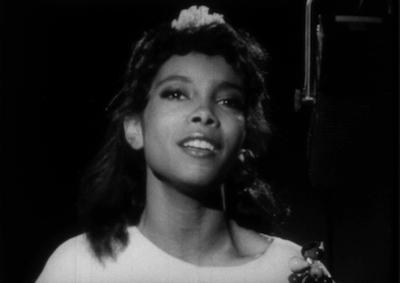"L.A. Rebellion" has become the most common term used to describe a group of Los Angeles-based African and African American film artists recognized largely for their work produced between the 1960s and 1980s, when most of them met as students in UCLA’s School of Theater, Film and Television. Since our initial exhibition and tour, “L.A Rebellion: Creating a New Black Cinema,” the Archive has continued to preserve films and tapes by members of the group, many of which were only identified after 2011. The following program highlights the work of women filmmakers in the L.A. Rebellion and for the first time includes work produced on video. Except for Julie Dash’s Illusions (1982), which has been newly restored, all the present work is premiering for the first time since their original screenings in newly preserved copies. In their variety, all the films have in common not only an African American woman’s perspective, but also a focus on the process of coming to political and social consciousness. —Jan-Christopher Horak
You are here
Revisiting L.A. Rebellion

Restored and funded by UCLA Film & Television Archive
The Single Parent: Images in Black (1982)
Filmmaker M. Stormé Bright’s The Single Parent: Images in Black (1982) examines what it is like to be an African American single parent. Parents discuss the challenges of being a single parent, how they deal with the assumptions of others, and how they continue living a “normal” life despite their new responsibilities. —Trisha Lendo
Producer: M. Stormé Bright. Director: M. Stormé Bright. Cinematographer: Alile Larkin, Craig Roberts, Jay Abramowitz, M. Stormé Bright. Cast: Glenn, Utamu, Gwen, Henry, Ronnie. DigiBeta, color, 22 min.
Digital preservation from 3/4” U-matic tape by UCLA Film & Television Archive, Digital Lab.
Preservation funded by UCLA Film & Television Archive
Azz Izz Jazz (1978)
Jacqueline Frazier’s Azz Izz Jazz showcases jazz legend Billie Harris who performs in studio with a quartet featuring Harris on soprano sax. Among the songs performed is “I Want Some Water,” a composition that Harris, in voice-over, credits, as with all his songs, to his young children who were his inspiration. In 1970, Harris, who died last year, founded the Venice, CA jazz club the Azz Izz which hosted such luminaries as Art Blakey, Horace Tapscott, Bobby Hutcherson and Billy Higgins. —Trisha Lendo
Director: Jacqueline Frazier. Cast: Billie Harris.
DigiBeta, color, 18 min.
Digital preservation from 3/4” U-matic tape by UCLA Film & Television Archive, Digital Lab.
Preservation funded by UCLA Film & Television Archive
My Dream is to Marry an African Prince (1984)
My Dream is to Marry an African Prince opens with a group of young students explaining their definition of royalty based on what they’ve seen in books, television, and films. The children are then visited by a woman and man who were raised in African villages, who teach them a history lesson on the traditions and customs of Africa, which includes visions of royalty unlike anything they’ve seen before. —Trisha Lendo
Producer: The Black Filmmakers Collective. Director: Stormé Bright, Alile Larkin. Screenwriter: The Black Filmmakers Collective. Cinematographer: Bert Yoshishigi. Editors: Dawnkwa Khan, Alile Larkin, Ben Caldwell. Cast: Melvonna Ballenger, Alile Larkin, Faola Ifagboyede, Adeyemi Oyelumi, Ayaba Iya Agotine. DigiBeta, color, 23 min.
Digital preservation from 3/4” U-matic tape by UCLA Film & Television Archive, Digital Lab.
Restored and funded by UCLA Film & Television Archive
Forbidden Joy (1972)
In Forbidden Joy (1972), director Imelda Sheen utilizes many avant garde techniques to tell the mysterious story of a woman picnicking in a cemetery with a toddler by her side. The films plays with mood as it changes styles of music from African, to funk, to soul, to classical, while black-and-white footage shows us a glimpse of the rough streets in the woman’s past. —Trisha Lendo
Director: Imelda Sheen. DigiBeta, color, 11 min.
Digital transfer from 16mm projection print by UCLA Film & Television Archive, Digital Lab.
Preservation funded by UCLA Film & Television Archive
African Woman USA (1980)
African Woman USA tells the story of an African woman studying dance in the U.S. and working to support a daughter at home, along with two others back in Africa. After receiving a work permit she is ecstatic, but must battle both sexism and racism when looking for a job. Her troubles continue when a man posing as a producer betrays her. The film uses jazz and traditional African music to underscore the themes of friendship and danger that shape an African immigrant’s experience of America. —Trisha Lendo
Director: Omah Diegu (Ijeoma Iloputaife). Screenwriter: Omah Diegu (Ijeoma Iloputaife). Cinematographer: Ben Caldwell. Music: Eugene Bohlmann. DigitBeta, color, 20 min.
Digital preservation from 3/4” U-matic tape by UCLA Film & Television Archive, Digital Lab.
Preservation funded by the National Film Preservation Foundation and Women Make Movies
Illusions (1982)
Julie Dash’s Illusions was filmed while she was a student at UCLA with a grant from Woman Make Movies. In post-World War II Hollywood, African American Mignon Dupreé passes as white to work as an executive assistant, a position she struggles to use to steer the studio towards stories about real people. Meanwhile at the same studio, African American singer Ester Jeeter is hired to dub the voice of a white actress. Duprée’s fascination with Hollywood’s power to rewrite history, is echoed in Dash’s sharp critique of that power to keep diversity out of the spotlight. —Trisha Lendo
Producer: Julie Dash. Director: Julie Dash. Screenwriter: Julie Dash. Cinematographer: Ahmed E Maanouni. Music: Eugene Bohlmann. Film Editors: Julie Dash, Charles Burnett. Cast: Lonette McKee, Rosanne Katon, Ned Bellamy, Jack Radar, Fernando Lundi Faust. DCP, b/w, 36 min.
Preserved from the original 16mm b/w reversal a/b rolls and from the original 35mm magnetic soundtrack. Laboratory services by Fotokem, Audio Mechanics, and Endpoint Audio Labs. Special thanks to: Julie Dash, Maurice Schechter.
To report problems, broken links, or comment on the website, please contact support
Copyright © 2025 UCLA Film & Television Archive. All Rights Reserved






 Mobile Navigation
Mobile Navigation
